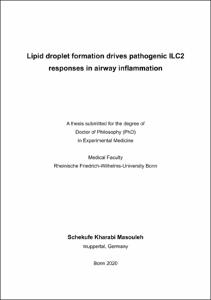Lipid droplet formation drives pathogenic ILC2 responses in airway inflammation

Lipid droplet formation drives pathogenic ILC2 responses in airway inflammation

| dc.contributor.advisor | Wilhelm, Christoph | |
| dc.contributor.author | Kharabi Masouleh, Schekufe | |
| dc.date.accessioned | 2020-06-08T12:43:15Z | |
| dc.date.available | 2020-06-08T12:43:15Z | |
| dc.date.issued | 08.06.2020 | |
| dc.identifier.uri | https://hdl.handle.net/20.500.11811/8401 | |
| dc.description.abstract | The Western world is affected by a dramatic increase of chronic inflammatory diseases like asthma, Crohn’s disease and psoriasis. Innate lymphoid cells (ILC) play an important role in the control and maintenance of barrier immunity but also in the development of several inflammatory diseases. Chronic activation of ILC results in immune-mediated pathology probably promoted by higher nutrient availability through life style changes coinciding with industrialization. In this thesis is shown that, in the context of allergen-driven airway inflammation, tissue resident ILC2 increase the uptake of both external lipids and glucose in the lung. Since gene expression analysis of ILC2 activated upon papain challenge did not reveal any substantial upregulation of genes involved in de novo lipid synthesis, it was suggested that externally acquired FA may be directly funneled into membrane lipids to support proliferation. Externally acquired fatty acids are transiently stored in lipid droplets to prevent lipotoxicity and promote the proliferation of ILC2 by using external lipids for membrane synthesis. This metabolic program is imprinted upon exposure to IL-33 and it is positively regulated by Pparγ and Dgat1, both partially controlled by glucose availability. Inhibition of PPARγ or DGAT1 leads to a strong decrease in ILC2 and eosinophil accumulation, as well as to lower inflammatory cytokine release by impacting lipid droplet formation. In vitro studies show that absence of glucose resulted in lower external FA uptake, lower lipid droplet formation and a strong downregulation of Pparγ and Dgat1. Strikingly, restriction of dietary glucose by feeding mice a ketogenic diet largely ablated ILC2-mediated airway inflammation by impairing fatty acid metabolism and the formation of lipid droplets. Taken together, these results reveal that pathogenic ILC2 responses require both lipid and glucose metabolism and identify ketogenic programs as a potent dietary intervention strategy to treat airway inflammation. | en |
| dc.language.iso | eng | |
| dc.rights | In Copyright | |
| dc.rights.uri | http://rightsstatements.org/vocab/InC/1.0/ | |
| dc.subject | ILC | |
| dc.subject | Lipid droplets | |
| dc.subject | airway inflammation | |
| dc.subject | fatty acids | |
| dc.subject.ddc | 540 Chemie | |
| dc.subject.ddc | 610 Medizin, Gesundheit | |
| dc.subject.ddc | 615 Pharmakologie, Therapeutik | |
| dc.title | Lipid droplet formation drives pathogenic ILC2 responses in airway inflammation | |
| dc.type | Dissertation oder Habilitation | |
| dc.publisher.name | Universitäts- und Landesbibliothek Bonn | |
| dc.publisher.location | Bonn | |
| dc.rights.accessRights | openAccess | |
| dc.identifier.urn | https://nbn-resolving.org/urn:nbn:de:hbz:5-58716 | |
| ulbbn.pubtype | Erstveröffentlichung | |
| ulbbnediss.affiliation.name | Rheinische Friedrich-Wilhelms-Universität Bonn | |
| ulbbnediss.affiliation.location | Bonn | |
| ulbbnediss.thesis.level | Dissertation | |
| ulbbnediss.dissID | 5871 | |
| ulbbnediss.date.accepted | 20.05.2020 | |
| ulbbnediss.institute | Medizinische Fakultät / Institute : Institut für Klinische Chemie und Klinische Pharmakologie | |
| ulbbnediss.fakultaet | Medizinische Fakultät | |
| dc.contributor.coReferee | Kurts, Christian |
Dateien zu dieser Ressource
Das Dokument erscheint in:
-
E-Dissertationen (2062)




